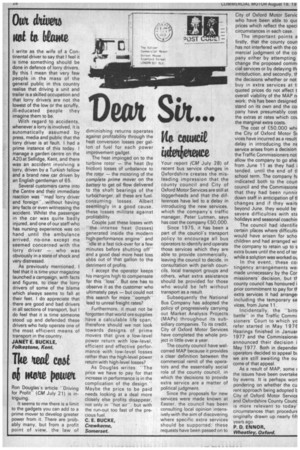Ike twat cog of won
Page 30

If you've noticed an error in this article please click here to report it so we can fix it.
Ron Douglas's article "Driving for Profit'' (CM July 21) is intriguing.
It seems to me there is a limit to the gadgets you can add to a prime mover to develop greater power from it. There are probably many, but from a profit point of view, the law of diminishing returns operates against profitability through the heat conversion losses per gallon of fuel for each power improvement gadget.
The heat impinged on to the turbine rotor — the heat (by friction) losses of unbalance to the rotor — the motoring of the complete prime mover on the battery to get oil flow delivered to the shaft bearings of the turbocharger, all these are fuelconsuming losses. Albeit seemingly in a good cause, these losses militate against profitability.
Couple just these losses with "the intense heat (losses) generated inside the modern high-performance engine" and "'idle at a fast tick-over for a few minutes before shutting off" and a good deal more heat loss ebbs out of that gallon to the detriment of profits.
I accept the operator keeps his margins high to compensate for this "loss". But one has to observe it as the customer who ultimately pays — but could not this search for more "oomph" lead to unreal freight rates?
Furthermore, it must not be forgotten that world ore supplies have a calculable life span, therefore should we not look towards designs of prime movers that give a low-level power return with low-level, efficient and effective performance with low-level losses rather than the high-level power return with high-level losses?
As Douglas writes. "The price we have to pay for that increase in performance is in the complication of the design.' Maybe the price to be paid needs looking at a deal more closely else profits disappear, not only in "hot air", but with the run-out too fast of the precious fuel.
C. E. BUCKE, Crewkerne, Somerset.
















































































































